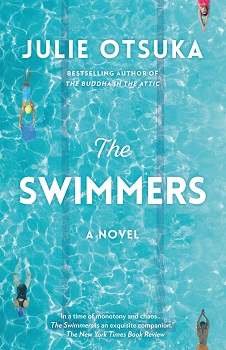The Swimmers by Julie Otsuka
Reviewed by Emma Radosevich, collection development librarian, Whatcom County Library System
At the community pool, obsessive lap swimmers adhere to a strict, unspoken social code. They stick to their lanes and keep an eye out for each other–especially Alice, who has been swimming laps here for 35 years. Her dementia doesn’t seem as big of a deal when she’s at the pool–in the water, she feels like herself again, and not just “another little old lady.”
A mysterious crack appears in the bottom of the pool overnight. Is the crack dangerous? Will the pool have to close for repairs? Suddenly, nothing seems certain for this community of fanatics who thrive on routine.
The first half is narrated by the swimmers themselves, a collective “we”; the second half is addressed to Alice’s daughter. In under 200 pages, Julie Otsuka has written a short novel, nearly a novella, that is lovely and surprisingly tender. The Swimmers is a book about memory, habits, and how a little social collapse can bring strangers together before it forces them apart again.
(originally published in Bellingham Alive, May, 2022)
The Swimmers by Julie Otsuka
Reviewed by Christine Perkins, executive director of the Whatcom County Library System
It takes a minute to dive below the surface of Julie Otsuka’s third novel, “The Swimmers,” because its style and point of view, told initially from the first person omniscient, is disorienting.
We know we’re in a pool, underground, where many people come to swim laps. Collectively, the swimmers are telling the story. Though Otsuka enumerates them with endless descriptive lists, who really is “we?”
“We are overeaters, underachievers, dog walkers, cross-dressers, compulsive knitters (just one more row), secret hoarders, minor poets, trailing spouses, twins, vegans … ” Her list goes on, in a stream of consciousness rush, till she sums it up: ” … down below, at the pool, we are only one of three things: fast-lane people, medium-lane people or the slow.”
If you’ve ever done a flip turn at Arne Hanna Aquatic Center, the YMCA or perhaps Western’s Rec Center pool, you will immediately recognize the regulars. Otsuka describes them knowingly: “Aggressive lappers, determined thrashers, oblivious backstrokers, stealthy submariners, middle-aged men who insist on speeding up the moment they sense they are about to be overtaken by a woman, tailgaters, lane Nazis, arm flailers …”
Otsuka’s paragraphs are one long run-on sentence after another, and if you find the quotes shared here to be too tedious, this book is not for you.
If you’re willing to paddle onward you’ll soon get into the meditative rhythm of a lap swimmer, whose mind can ponder the infiniteness of the universe while focusing solely on the rippled black line at the bottom of the pool. That’s what “we” do, secure in “our” subterranean world, until one day, “we” notice a crack in the concrete at the deep end of lane four. The crack sets the swimmers into a spin, unsettling them and ultimately forcing them to venture back into the world.
The next section of the novel alights on Alice, one of the swimmers, who has dementia. Without the exercise and familiar routine of going to the pool, she becomes more and more disoriented.
Otsuka deftly conjures Alice’s experience through her vivid memories: “She remembers that you once had a cat named Gasoline. She remembers that you had two turtles named Turtle. She remembers that the first time she and your father took you to Japan to meet his family you were 18 months old and just beginning to speak … She remembers that a blind fortune-teller once told her she had been a man in her past life … She remembers that everything she remembers is not necessarily true.” These closing observations sneak up and surprise with their honesty and clarity.
When Alice goes to live at Belavista, a memory care facility, the narrative voice shifts again, to second-person singular (“you”) although it is evident that “you” is Alice’s daughter. Otsuka’s portrayal of a long-distant daughter coming to terms with her mother’s decline is emotionally wrenching but not overly maudlin.
The daughter, an author, submerges briefly into her mother’s world, belatedly seeing her for the first time. It’s a unique and unforgettable portrayal of a bittersweet mother-daughter relationship that recently won Otsuka a Carnegie Medal for Excellence. Readers who are losing or have lost loved ones to dementia will be particularly moved.
Christine Perkins is executive director of the Whatcom County Library System, wcls.org, which serves all the communities in Whatcom County outside the city limits of Bellingham. Experience the power of sharing — at the library!
(Originally published in Cascadia Daily News, Saturday, March 11, 2023.)

